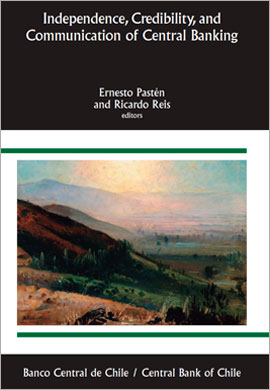Series: Envíos recientes
Mostrando ítems 31-40 de 378
-
The reversal problem: development going backwards
(Banco Central de Chile, 2023-08-09)The Covid-19 pandemic triggered the most synchronous economic downturn in more than a century. Ninety percent of countries posted a decline in real per-capita GDP in 2020, a share that surpassed any other year since 1900, ... -

Independence, credibility, and communication of central banking
(Banco Central de Chile, 2021-10)The three topics covered in the title of this volume have proved to be critical in the remarkable success of modern central banks around the globe in the fight to control inflation and smooth macroeconomic fluctuations. ... -
Independence, credibility, and communication of central banking: an overview
(Banco Central de Chile, 2021-10)The institution of central-bank independence is often lauded as a great conquest of the accumulation of knowledge and the sensible setting of policy. The economic literature is filled with arguments for why an independent ... -
Public trust and central banking
(Banco Central de Chile, 2021-10)Central bank independence is one of the most remarkable pieces of institutional architecture fostered by economic thinking in the last half century. Theoretical studies in the 1980s stressed central bank independence as a ... -
Risks to central-bank independence
(Banco Central de Chile, 2021-10)Central banking today faces a number of existential challenges. On the political side, and particularly after the financial crisis, the public has come to expect central banks to take on a dizzying array of responsibilities, ... -
The transformation and performance of emerging market economies across the great divide of the global financial crisis
(Banco Central de Chile, 2021-10)Before the Global Financial Crisis, a drive towards greater central-bank autonomy and transparency, as part of the achievement of greater central-bank credibility that had begun in the advanced economies (AE), spread to ... -
Inflation targeting under political pressure
(Banco Central de Chile, 2021-10)Historically, many emerging economies, particularly in Latin America, battled against persistently high and volatile inflation. Today, emerging economies continue to experience higher inflation than developed ones, and ... -
The fiscal footprint of macroprudential policy
(Banco Central de Chile, 2021-10)Monetary policies leave a fiscal footprint. When the central bank cuts the policy interest rate, this footprint comes through multiple channels: The demand for currency rises, so the central bank prints more banknotes to ... -
Central banking with many voices: the communications arms race
(Banco Central de Chile, 2021-10)The job of central bankers is to use the monetary powers granted to them to promote price stability, sustainable growth, and a stable financial system. They do this in an environment fraught with unavoidable uncertainties. ... -
Comfort in floating: taking stock of twenty years of freely floating exchange rate in Chile
(Banco Central de Chile, 2021-10)Chile offers an example of a country that has overcome the fear of floating by reducing balance-sheet mismatches; enhancing financial-market development; and improving monetary, fiscal, and political institutions; while ...
